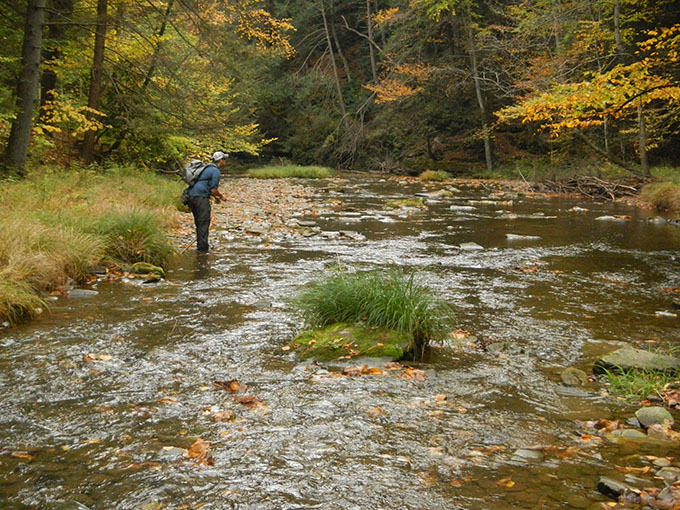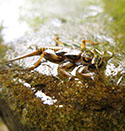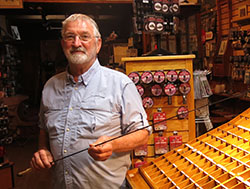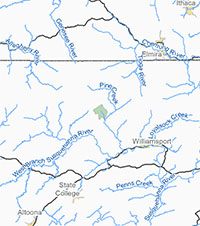As natural gas extraction expands across the Central Appalachian region, that industrial-scale energy development is encroaching on public lands that are critically important for fishing and hunting. In this report, Trout Unlimited takes a deeper look into those public places, outlining the potential risks posed by gas drilling operations and providing recommendations from sportsmen and women that promote responsible energy development.
Slate Run

The Place
Known for its ledges and deep pockets, Slate Run is an exceptional value freestone stream and legendary trout fishing destination. It begins its descent in from rugged mountains on state forest lands, flowing 7 miles downstream where it enters Pine Creek in the village of Slate Run. Nearly the entire Slate Run watershed — about 45 square miles — lies in and adjacent to the Tiadaghton State Forest, where primitive camping offers hearty anglers a wild experience. Black bear and other large and small game inhabit the watershed and provide for abundant hunting and wildlife viewing opportunities.Small brook trout and nice browns can be found in Slate Run’s headwaters and tributaries, and the stream is considered a Heritage Trout Stream, limited to catch-and-release fishing for its entire length. A neighboring stream — Cedar Run — offers similar serene and challenging trout fishing, particularly in the trophy trout sections.
The Threat
While the Slate Run watershed is largely untouched by man, industrial shale gas development is encroaching from the south, north and east. Much of the nearby shale gas drilling is happening on state forest and game lands or on private hunting and fishing club lands. Recent attempts by Pennsylvania’s decision-makers to lease additional state forest lands and state park lands could affect Slate Run’s native and wild trout resources, and the peaceful fishing experience it offers. Shale gas-related development occurring on the steep slopes of the Slate Run watershed could result in excessive sedimentation entering the mainstem and its tributaries, affecting water quality and trout habitat, and smothering food sources.The Need to Protect
 Sportsmen and women — those who spend a significant amount of time hunting and fishing on public lands — must have a say in how and where shale gas development is allowed to occur on state forest lands. Together, hunters and anglers are calling on Pennsylvania’s decision-makers to prohibit additional leasing of state forest and park lands, where the state owns the mineral rights. Where mineral rights underneath state lands are privately owned, sportsmen are urging the state to play a role in the planning process, to ensure that impacts to critical fish and wildlife habitat are avoided or minimized, and that the high quality of the hunting and angling experiences in the Slate Run watershed and on public lands is preserved.
Sportsmen and women — those who spend a significant amount of time hunting and fishing on public lands — must have a say in how and where shale gas development is allowed to occur on state forest lands. Together, hunters and anglers are calling on Pennsylvania’s decision-makers to prohibit additional leasing of state forest and park lands, where the state owns the mineral rights. Where mineral rights underneath state lands are privately owned, sportsmen are urging the state to play a role in the planning process, to ensure that impacts to critical fish and wildlife habitat are avoided or minimized, and that the high quality of the hunting and angling experiences in the Slate Run watershed and on public lands is preserved.
SPORTSMEN IN THE SPOTLIGHT
I stumbled on this area absolutely by chance. … When I dropped down into this valley and saw Pine Creek, I knew this was the spot I was looking for.” Tom Finkbiner, Owner of Slate Run Tackle Shop



